A&S Faculty News
March 2017
Kingston on Declining Bat Numbers
 Tigga Kingston, an Associate Professor in the Department of Biological Sciences, wrote
a Perspectives article in Science magazine, asking, "Can we protect island flying foxes?" Kingston and co-authors Christian
E. Vincenot from Kyoto University and F. B. Vincent Florens from University of Mauritius
hope to promote conservation action and research on the bats to halt further declines.
"Island flying foxes were recognized as a group of conservation concern more than
30 years ago when intense hunting and commercial trading of species on Pacific islands
precipitated the extinction of at least one species, the endemic Guam flying fox,
and led to dramatic declines in others," Kingston told Texas Tech Today in a March
30 story about the animals' plight. "Thirty years later, flying fox populations on
islands are still declining because of hunting and habitat loss, and new issues, notably
conflict between bats and fruit growers over crops, have arisen." (Photo of Mauritius Fruit Bat. Credit: Jaques de Speville)
Tigga Kingston, an Associate Professor in the Department of Biological Sciences, wrote
a Perspectives article in Science magazine, asking, "Can we protect island flying foxes?" Kingston and co-authors Christian
E. Vincenot from Kyoto University and F. B. Vincent Florens from University of Mauritius
hope to promote conservation action and research on the bats to halt further declines.
"Island flying foxes were recognized as a group of conservation concern more than
30 years ago when intense hunting and commercial trading of species on Pacific islands
precipitated the extinction of at least one species, the endemic Guam flying fox,
and led to dramatic declines in others," Kingston told Texas Tech Today in a March
30 story about the animals' plight. "Thirty years later, flying fox populations on
islands are still declining because of hunting and habitat loss, and new issues, notably
conflict between bats and fruit growers over crops, have arisen." (Photo of Mauritius Fruit Bat. Credit: Jaques de Speville)
Kendall to Study Monarch Needs
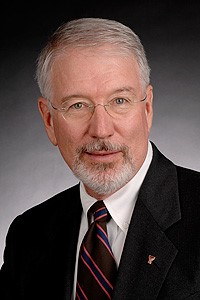 Ron Kendall, Professor of Environmental Toxicology at The Institute of Environmental
& Human Health (TIEHH), has received a $180,817 grant from chemical producer BASF to research the habitat needs of monarch butterflies. The population of this migratory
species has declined and estimated 90 percent or more over the past 20 years, and
one of the major factors in that decline is attributed to habitat loss, according
to a March 29 story in Texas Tech Today. Some estimates show the butterflies have
lost more than 165 million acres of their natural habitat—that's roughly the size
of Texas. Kendall will be collaborating with the University of Arkansas and the University
of Minnesota, also funded by BASF grants. "We're looking at a variety of plant issues
as well as monarch utilization of those plants," Kendall told Texas Tech Today. "A
plant particularly important to the monarch is milkweed; it's critical to their reproduction.
A variety of flowering plants are also important. So we're looking at a variety of
issues, with questions of habitat but also environmental contaminants and other risks
to the species." Research already has begun and is expected to last several years.
"This research involves a better understanding of monarch needs, particularly the
kinds of plants they need, both in their spring migration and fall migration, to facilitate
their survival and reproduction," Kendall said, adding that Texas is critical to the
monarchs because of their migration patterns. "Various populations of these monarchs
move through various parts of the United States, but the most important and major
movement is from their wintering grounds in Mexico through Texas," Kendall said. "If
things aren't good in Texas as they're moving north for their spring reproduction,
they're probably going to suffer the rest of the year." Through its research-based
initiative Living Acres, BASF is focused on the monarch because of its effects on
agriculture. As a pollinator of fruits, nuts and vegetables, monarchs play a vital
role in the ecosystem and economy. Because of this, BASF hopes to encourage farmers
to plant milkweed in non-cropland areas, such as ditches, roadsides, alleyways and
border areas, to help increase monarch numbers. Milkweed is the only plant monarch
butterfly larvae feed on, so it's a critical element in their life cycle. The U.S.
Fish & Wildlife Service is currently conducting an assessment to determine whether
the monarch butterfly should be protected under the Endangered Species Act, but a
ruling is still years away. A decision on the listing is expected in June 2019.
Ron Kendall, Professor of Environmental Toxicology at The Institute of Environmental
& Human Health (TIEHH), has received a $180,817 grant from chemical producer BASF to research the habitat needs of monarch butterflies. The population of this migratory
species has declined and estimated 90 percent or more over the past 20 years, and
one of the major factors in that decline is attributed to habitat loss, according
to a March 29 story in Texas Tech Today. Some estimates show the butterflies have
lost more than 165 million acres of their natural habitat—that's roughly the size
of Texas. Kendall will be collaborating with the University of Arkansas and the University
of Minnesota, also funded by BASF grants. "We're looking at a variety of plant issues
as well as monarch utilization of those plants," Kendall told Texas Tech Today. "A
plant particularly important to the monarch is milkweed; it's critical to their reproduction.
A variety of flowering plants are also important. So we're looking at a variety of
issues, with questions of habitat but also environmental contaminants and other risks
to the species." Research already has begun and is expected to last several years.
"This research involves a better understanding of monarch needs, particularly the
kinds of plants they need, both in their spring migration and fall migration, to facilitate
their survival and reproduction," Kendall said, adding that Texas is critical to the
monarchs because of their migration patterns. "Various populations of these monarchs
move through various parts of the United States, but the most important and major
movement is from their wintering grounds in Mexico through Texas," Kendall said. "If
things aren't good in Texas as they're moving north for their spring reproduction,
they're probably going to suffer the rest of the year." Through its research-based
initiative Living Acres, BASF is focused on the monarch because of its effects on
agriculture. As a pollinator of fruits, nuts and vegetables, monarchs play a vital
role in the ecosystem and economy. Because of this, BASF hopes to encourage farmers
to plant milkweed in non-cropland areas, such as ditches, roadsides, alleyways and
border areas, to help increase monarch numbers. Milkweed is the only plant monarch
butterfly larvae feed on, so it's a critical element in their life cycle. The U.S.
Fish & Wildlife Service is currently conducting an assessment to determine whether
the monarch butterfly should be protected under the Endangered Species Act, but a
ruling is still years away. A decision on the listing is expected in June 2019.
Bradatan, Hayhoe Talk on Migrants
Cristina Bradatan, Associate Professor of Sociology in the Department of Sociology, Anthropology & Social Work; and Katharine Hayhoe, Professor in the Department of Political Science and Director of the TTU's Climate Science Center, were quoted in the March 29 Daily Toreador story: "Climate Change May Increase Immigration Problems." Bradatan was quoted in the story as saying that in the past, people from Mexico came to the United States for economic reasons. "Now, what's happening with climate change is that climate change will affect the amount of rain that the land receives." The result: a population on the move, very likely migrating to places like the United States where they already have connections to a network of people who can help.
Swingen Gets NEH Endowment
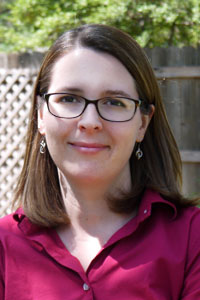 Abigail Swingen, Associate Professor and Director of Undergraduate Studies in the
Department of History, has received a $6,000 grant from the National Endowment for
the Humanities (NEH) as a summer stipend for her research project, "The Financial
Revolution and the British Empire During the 17th and 18th Centuries." In an April
19 article published in Texas Tech Today, Swingen said her book's major contribution
will be the connections it makes between economic transformations and developments
related to Britain's early modern empire. "For example, the development of overseas
trading companies as investment opportunities, such as the East India Company, the
Royal African Company and the South Sea Company, was intimately connected to imperial
expansion, overseas trade and colonial settlement. This indicated a level of understanding
of a world beyond London on the part of investors." Her award was announced March
29, along with those of 207 other NEH grant recipients. Swingen is author of "Competing
Visions of Empire: Labor, Slavery, and the Origins of the British Atlantic Empire"
(Yale, 2015).
Abigail Swingen, Associate Professor and Director of Undergraduate Studies in the
Department of History, has received a $6,000 grant from the National Endowment for
the Humanities (NEH) as a summer stipend for her research project, "The Financial
Revolution and the British Empire During the 17th and 18th Centuries." In an April
19 article published in Texas Tech Today, Swingen said her book's major contribution
will be the connections it makes between economic transformations and developments
related to Britain's early modern empire. "For example, the development of overseas
trading companies as investment opportunities, such as the East India Company, the
Royal African Company and the South Sea Company, was intimately connected to imperial
expansion, overseas trade and colonial settlement. This indicated a level of understanding
of a world beyond London on the part of investors." Her award was announced March
29, along with those of 207 other NEH grant recipients. Swingen is author of "Competing
Visions of Empire: Labor, Slavery, and the Origins of the British Atlantic Empire"
(Yale, 2015).
Koch's Tattoo Study in Op-Ed
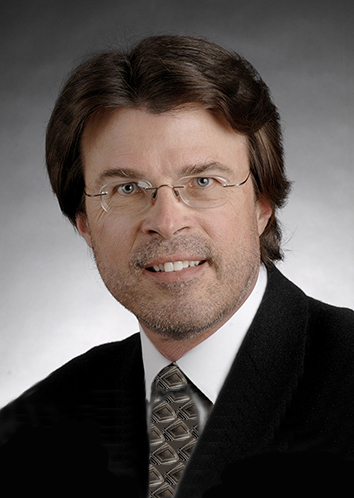 Jerome Koch, Professor of Sociology in the Department of Sociology, Anthropology &
Social Work, was referenced in a newspaper opinion piece about tattoos: "Companies
Need to Respect Tattoos," published March 28 in the Missourian Reporter. The writer
of the opinion piece supported the emotional and artistic value that tattoos hold
for the Millennial generation and argued that employers should not "penalize job-searching
college graduates for their artistic creativity" by refusing to hire those with visible
tattoos. Koch was cited for his study "Body Art, Deviance, and American College Students."
The writer used Koch's research findings—that individuals who have heavy ink done
are more prone to having involvement in illegal drug use and binge drinking—as an
example of information that perpetuates a prejudice against hiring "inked young adults."
Jerome Koch, Professor of Sociology in the Department of Sociology, Anthropology &
Social Work, was referenced in a newspaper opinion piece about tattoos: "Companies
Need to Respect Tattoos," published March 28 in the Missourian Reporter. The writer
of the opinion piece supported the emotional and artistic value that tattoos hold
for the Millennial generation and argued that employers should not "penalize job-searching
college graduates for their artistic creativity" by refusing to hire those with visible
tattoos. Koch was cited for his study "Body Art, Deviance, and American College Students."
The writer used Koch's research findings—that individuals who have heavy ink done
are more prone to having involvement in illegal drug use and binge drinking—as an
example of information that perpetuates a prejudice against hiring "inked young adults."
Hayhoe One of 'Greatest Leaders'
Katharine Hayhoe, Associate Professor in the Department of Political Science and Director of TTU's Climate Science Center, was the focus of a March 27 Texas Tech Today story about her being named to the list of Fortune Magazine's World's Greatest Leaders. "My work may defy some stereotypes about the politics of science and religion," Hayhoe told Texas Tech Today. "By defying stereotypes, my hope is that this creates the opportunity for all of us to consider what we truly value and to align our attitudes and decisions with the values that define us." Hayhoe ranked No. 15 on the list of 50 people that included Chicago Cubs president of baseball operations Theo Epstein (No. 1), Pope Francis (No. 3), and German Chancellor Angela Merkel (No. 10).
Zdenek Closed-Captioning Awarded
Sean Zdenek, Associate Professor in the Department of English, won the 2017 Best Book in Technical or Scientific Communication award for his title, "Reading Sounds: Closed-Captioned Media and Popular Culture" (University of Chicago Press, 2015). The award was presented by the Conference on College Composition and Communication (CCCC) in March. Zdenek teaches graduate and undergraduate students of Technical Communication & Rhetoric through courses in disability studies, web accessibility, document design, sound studies, report writing, multimodal composition, developing instructional materials, style, and rhetorical criticism.
Moore Wins Nell Ann Picket Award
Kristen Moore, Assistant Professor in the Department of English, won the 2017 Nell Ann Picket Award for Best Article in Technical Communication Quarterly. The award, granted by the Association of Teachers of Technical Writing (ATTW), was for the article, "Disrupting the Past to Disrupt the Future: An Antenarrative of Technical Communication," published in Volume 25.4, 2016. Moore teaches courses in Technical Communication & Rhetoric and shares the Nell Ann Picket Award with co-authors Natasha Jones, assistant professor at the University of Central Florida, and Rebecca Walton, assistant professor at Utah State University.
Perkins Talks About Gorsuch
Jared Perkins, visiting professor in the Department of Political Science, was quoted in a March 20 FOX-34 news piece about the Senate confirmation hearings of Judge Neil M. Gorsuch, nominated by President Trump to the Supreme Court. Perkins was quoted as saying that he thought the hearings would center on the judge's prior cases, rather than his overall belief system, in order for the senators to get an indication of how Judge Gorsuch would rule in cases that would come before the Supreme Court.
Ramkumar on Cotton for Oil Spills
 Seshadri Ramkumar, professor in the Department of Environmental Toxicology/The Institute
for Environmental & Human Health (TIEHH) and head of TTU's Nonwovens & Advanced Materials
Laboratory, was featured in three in-depth stories about his group's research on the
uses of low-grade cotton. On March 20, the Daily Toreador published "Cotton Cleanup:
Raw Cotton Found to Be Best for Oil Spill Remediation." That article reported that
Ramkumar's lab had found that unprocessed cotton straight from the bale was most efficient
in absorbing oil from water. On March 5, The Lubbock Avalanche-Journal quoted Ramkumar
as saying that low-grade cotton is more absorbent than fully matured cotton and that,
when used in a loose form, its ability to absorb oil is superior to textile-grade
cotton—and preferable to synthetic materials because it is biodegradable. That story
followed a Feb. 27 story in Texas Tech Today that, in addition to describing the technical
attributes of low-grade cotton, focused on the collaborative efforts of the research,
which included the Department of Mechanical Engineering; the U.S. Department of Agriculture's
Agricultural Research Service in New Orleans; and the budding research assistance
of Ronald Kendall Jr. and Luke Kitten, who were seniors at Coronado High School and
Lubbock's Trinity Christian High School, respectively, during the study.
Seshadri Ramkumar, professor in the Department of Environmental Toxicology/The Institute
for Environmental & Human Health (TIEHH) and head of TTU's Nonwovens & Advanced Materials
Laboratory, was featured in three in-depth stories about his group's research on the
uses of low-grade cotton. On March 20, the Daily Toreador published "Cotton Cleanup:
Raw Cotton Found to Be Best for Oil Spill Remediation." That article reported that
Ramkumar's lab had found that unprocessed cotton straight from the bale was most efficient
in absorbing oil from water. On March 5, The Lubbock Avalanche-Journal quoted Ramkumar
as saying that low-grade cotton is more absorbent than fully matured cotton and that,
when used in a loose form, its ability to absorb oil is superior to textile-grade
cotton—and preferable to synthetic materials because it is biodegradable. That story
followed a Feb. 27 story in Texas Tech Today that, in addition to describing the technical
attributes of low-grade cotton, focused on the collaborative efforts of the research,
which included the Department of Mechanical Engineering; the U.S. Department of Agriculture's
Agricultural Research Service in New Orleans; and the budding research assistance
of Ronald Kendall Jr. and Luke Kitten, who were seniors at Coronado High School and
Lubbock's Trinity Christian High School, respectively, during the study.
Patterson on Amarillo Government
Dennis Patterson, professor and chair of the Department of Political Science, was quoted in a March 18 article about Amarillo city government that ran in the Amarillo Globe-News. The story told how Amarillo (population 196,000) is the only Texas city of its size to have so few city council members: it only has four, all of whom serve a two-year term and come up for re-election at the same time. Patterson was quoted in connection with the possibility, or perhaps lack thereof (the article was vaguely worded), of term lengths, limits, and council size being changed.
Presley Tracking Zika Risk in Texas
 Steve Presley, professor of immunotoxicology in the Department of Environmental Toxicology
and director of TTU's Biological Threat Laboratory, was interviewed for a March 15
KAMC-TV news piece, "TTU Researchers Tracking Potential Zika Risks." Presley is one
of the entomologists working with the Texas Department of State Health Services to
identify, control, and prevent Zika in the state. KAMC-TV reported that two types
of mosquitoes, aedes albopictus and aedes aegypti, can carry Zika virus, and state
records show that one or both of those types have been found in the following Panhandle-South
Plains counties: Oldham, Potter, Randall, Donley, Swisher, Briscoe, Hall, Childress,
Bailey, Hale, Motley, Cottle, Cochran, Lubbock, Crosby, Dickens, Terry, Borden, Scurry,
and Fisher. "Because most of those counties are rural, we weren't sure if we'd find
them or not, because both of those species of mosquitoes are considered backyard breeders,"
Presley told the television station, adding that a mild winter and a warm, early spring
may lead to an intense mosquito season for the South Central U.S. The report quoted
Presley as saying that the next step in public health mosquito research is to see
how the mosquitoes respond to or resist the pesticides that cities are using to treat
them.
Steve Presley, professor of immunotoxicology in the Department of Environmental Toxicology
and director of TTU's Biological Threat Laboratory, was interviewed for a March 15
KAMC-TV news piece, "TTU Researchers Tracking Potential Zika Risks." Presley is one
of the entomologists working with the Texas Department of State Health Services to
identify, control, and prevent Zika in the state. KAMC-TV reported that two types
of mosquitoes, aedes albopictus and aedes aegypti, can carry Zika virus, and state
records show that one or both of those types have been found in the following Panhandle-South
Plains counties: Oldham, Potter, Randall, Donley, Swisher, Briscoe, Hall, Childress,
Bailey, Hale, Motley, Cottle, Cochran, Lubbock, Crosby, Dickens, Terry, Borden, Scurry,
and Fisher. "Because most of those counties are rural, we weren't sure if we'd find
them or not, because both of those species of mosquitoes are considered backyard breeders,"
Presley told the television station, adding that a mild winter and a warm, early spring
may lead to an intense mosquito season for the South Central U.S. The report quoted
Presley as saying that the next step in public health mosquito research is to see
how the mosquitoes respond to or resist the pesticides that cities are using to treat
them.
Maccarone Uses Radio Waves
Tom Maccarone, associate professor in the Department of Physics & Astronomy, played a part in finding a star that orbits a black hole twice an hour, according to a March 13 Texas Tech Today story. Astronomers knew about this "binary," but by scanning for radio waves — a research method Maccarone pioneered — they now think that the X9 binary, located in the globular cluster 47 Tucanae, may be an accreting black hole orbited by a white dwarf.
Chatterjee Findings Republished
Sankar Chatterjee, professor in the Department of Geosciences and Curator of Paleontology at the Museum of Texas Tech University is on an international team of scientists who have discovered that Cretaceous-era birds possessed a vocal organ that allowed them to make noise. The organ, called a syrinx, was found in an Antarctic fossil. So far, scientists have not found a similar organ in dinosaur remains from that era. Findings were republished March 12 in Military News from Nature (Oct. 12, 2016).
Milam in New York Times
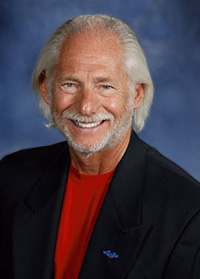 Ron Milam, associate professor in the Department of History and interim director of
Texas Tech's new Institute for Peace and Conflict, and three History graduate students,
have written articles for the New York Times series, "Vietnam '67." The scholars are
featured in a March 10 Texas Tech Today story about their work. Milam's article, "1967:
The Era of Big Battles in Vietnam," kicked off the series when it published Jan. 10.
It was followed on Jan. 17 by "As the Earth Shook, they Stood Firm," written by History
doctoral candidate Hai T. Nguyen, who grew up in Vietnam. History doctoral candidate
Amber Batura, a first-generation college student from Ozona, Texas, wrote "How Playboy
Explains Vietnam," which published Feb. 28. Another first-generation college student
and history doctoral candidate, Carie Nguyen, is writing about American soldiers'
attitudes toward their allies, the Army of the Republic of Vietnam; her article will
publish this summer.
Ron Milam, associate professor in the Department of History and interim director of
Texas Tech's new Institute for Peace and Conflict, and three History graduate students,
have written articles for the New York Times series, "Vietnam '67." The scholars are
featured in a March 10 Texas Tech Today story about their work. Milam's article, "1967:
The Era of Big Battles in Vietnam," kicked off the series when it published Jan. 10.
It was followed on Jan. 17 by "As the Earth Shook, they Stood Firm," written by History
doctoral candidate Hai T. Nguyen, who grew up in Vietnam. History doctoral candidate
Amber Batura, a first-generation college student from Ozona, Texas, wrote "How Playboy
Explains Vietnam," which published Feb. 28. Another first-generation college student
and history doctoral candidate, Carie Nguyen, is writing about American soldiers'
attitudes toward their allies, the Army of the Republic of Vietnam; her article will
publish this summer.
Mechref Interviewed in Video
Yehia Mechref, professor in the Department of Chemistry & Biochemistry and Director of Texas Tech University's Center for Biotechnology & Genomics, was interviewed about his breast-to-brain cancer research by TTU's managing director of Communications & Marketing Chris Cook. The video, posted on Facebook March 9, follows Cook as he picks up Mechref by golf cart and takes him for coffee and a chat.
Dhurandhar in Consumer Reports
Emily Dhurandhar, assistant professor of Kinesiology in the Department of Kinesiology & Sport Management, was quoted in an MSN.com story, originally published in Consumer Reports March 8, on "How to Pick a Healthy Cereal." Dhurandhar noted in the story that whole grains are a great source of fiber and help people feel full. Those who get plenty of fiber at breakfast are "not going to be having a hunger attack mid-morning," she was quoted as saying.
Hayhoe Listed as World-Changer
Katharine Hayhoe, associate professor in the Department of Political Science and Director of TTU's Climate Science Center, is one of many female scientists interviewed for the March 8, EcoWatch article, "These 76 Women Scientists Are Changing the World." The story takes up the problem of female leadership in STEM and what Hayhoe describes in the article as lifestyle and family changes that present a particular sticking point between the genders in STEM.
Weiss Leads Tornado Chase in U.S.
 Chris Weiss, associate professor of Atmospheric Science in the Department of Geosciences,
is leading a team of TTU researchers on a congressionally mandated tornado hunt. Weiss'
group is in the American Southeast—a part of the nation where the terrain makes it
harder to warn of deadly tornadoes—from March 8 through May 8. They'll collect meteorological
data in hopes of determining the specific conditions that produce tornadoes in that
region of the country. Their project is the Verification of the Origins of Rotation
in Tornadoes Experiment-Southeast, or VORTEX-SE. The four-member team will deploy
several platforms, including StickNets, weather balloons, and lightning mapping array
sensors. "There's a lot of theories about what the environment does to influence the
development of tornadoes, so we're going to try to make those measurements," Weiss
told Texas Tech Today in a March 7 story. Texas Tech's part in the research also was
mentioned in a WHNT (Huntsville, Ala.) news feature March 21.
Chris Weiss, associate professor of Atmospheric Science in the Department of Geosciences,
is leading a team of TTU researchers on a congressionally mandated tornado hunt. Weiss'
group is in the American Southeast—a part of the nation where the terrain makes it
harder to warn of deadly tornadoes—from March 8 through May 8. They'll collect meteorological
data in hopes of determining the specific conditions that produce tornadoes in that
region of the country. Their project is the Verification of the Origins of Rotation
in Tornadoes Experiment-Southeast, or VORTEX-SE. The four-member team will deploy
several platforms, including StickNets, weather balloons, and lightning mapping array
sensors. "There's a lot of theories about what the environment does to influence the
development of tornadoes, so we're going to try to make those measurements," Weiss
told Texas Tech Today in a March 7 story. Texas Tech's part in the research also was
mentioned in a WHNT (Huntsville, Ala.) news feature March 21.
Hayhoe's Climate Projections Cited
Katharine Hayhoe, associate professor in the Department of Political Science and Director of TTU's Climate Science Center, was referenced in a March 3 Austin American-Statesman article about Austin's Climate Protection Plan. The story pointed to Hayhoe's 2014 research via ATMOS Research & Consulting, "Climate Change Projections for the City of Austin."
Swingen Gets Huntington Grant
 Abigail Swingen, associate professor and Director of Undergraduate Studies in the
Department of History, has received a travel grant from the Huntington Library to
conduct research in the United Kingdom this summer. The travel grant comes with a
$3,000 stipend to support the costs of one month of research. Swingen will use the
grant to conduct research in London for her current book project, "The Financial Revolution
and the British Empire," a project that explores the connections between the profound
social and economic changes associated with Britain's Financial Revolution in the
late 17th century and the origins of Britain's Atlantic empire and how contemporaries
understood and confronted financial and economic change. Steve Hindle, W.M. Keck Foundation
Director of Research at the Huntington Library, told Swingen in a congratulatory letter
that these awards are highly competitive. "We had 78 applications for six places,
and you are therefore to be congratulated on the excellence of your proposal," Hindle
wrote. Swingen is author of "Competing Visions of Empire: Labor, Slavery, and the
Origins of the British Atlantic Empire" (Yale, 2015).
Abigail Swingen, associate professor and Director of Undergraduate Studies in the
Department of History, has received a travel grant from the Huntington Library to
conduct research in the United Kingdom this summer. The travel grant comes with a
$3,000 stipend to support the costs of one month of research. Swingen will use the
grant to conduct research in London for her current book project, "The Financial Revolution
and the British Empire," a project that explores the connections between the profound
social and economic changes associated with Britain's Financial Revolution in the
late 17th century and the origins of Britain's Atlantic empire and how contemporaries
understood and confronted financial and economic change. Steve Hindle, W.M. Keck Foundation
Director of Research at the Huntington Library, told Swingen in a congratulatory letter
that these awards are highly competitive. "We had 78 applications for six places,
and you are therefore to be congratulated on the excellence of your proposal," Hindle
wrote. Swingen is author of "Competing Visions of Empire: Labor, Slavery, and the
Origins of the British Atlantic Empire" (Yale, 2015).
Ribeiro on Board of Trustees
Anna Christina Ribeiro, associate professor in the Department of Philosophy, has been elected to the Board of Trustees of the American Society for Aesthetics (2017-2020). Her area of specialization is aesthetics, particularly the philosophies of literature and poetry, and her monograph, "Beautiful Speech: The Nature, Origins, and Powers of Poetry," is under contract with Oxford University Press.
Webb Awarded Scholarship
Mark Webb, professor and chair of the Department of Philosophy, was awarded a Lawrence Schovanec Teaching Development Scholarship. Webb is author of "A Comparative Doxastic-Practice Epistemology of Religious Experience" (Springer 2015). The book takes a theoretical enterprise in Christian philosophy of religion and applies it to Buddhism in this second volume in the Springer Briefs in Religious Studies series.
Hom Named Alumni College Fellow
Christopher Hom, associate professor in the Department of Philosophy, was selected as a 2017 Alumni College Fellow. Hom's main areas of research are in the philosophy of language and metaethics, specifically on the topics of racial slurs, structured propositions, and normative language, generally. He also takes interest in philosophy of mind, philosophy of race, and philosophical logic.
Trindade Gets President's Award
Alex Trindade, professor of statistics in the Department of Mathematics & Statistics, is the recipient of the President's Excellence in Teaching Award 2017. Along with Jose Manuel Carro Casals, Alfredo Garcia-Hiernaux, Miguel Jerez, and Sonia Sotoca, he is co-author of "State-Space Methods for Time Series Analysis: Theory, Applications and Software" (CRC Press, 2016).
Math Names Top Faculty Mentors
The Department of Mathematics & Statistics has announced its recipients of the 2017 Outstanding Faculty Mentor Award. They are:
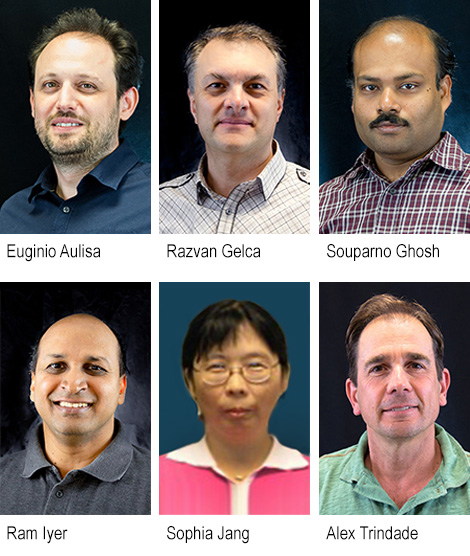
Diaz on Texas 'Nationalism'
Angela Diaz, a postdoctoral teaching fellow in the Department of History, was the subject of a March 1 story in Texas Tech Today for her insights on Texas independence. Diaz is quoted as saying that Texas has constructed a unique culture and a unique mythology around independence. "The idea of an independent Texas nation, I think, is more valued today than it was in the 1830s and 1840s," Diaz told Texas Tech Today. Texas won its independence from Mexico in 1836, but the new Republic of Texas didn't necessarily want to remain independent, Diaz was quoted as saying. "Texans were very invested in being annexed into the United States," she said. "Being an independent nation is very difficult, and they were heavily in debt and vulnerable to being taken over again by Mexico or several other countries interested in gaining territory in North America. Today, we have a notion of the Texas Republic as something that marks us as a different kind of place than other parts of the United States. That's one of the Texas Revolution's legacies, this cultural mythology of a frontier type place. It's really the birth of Texas culture in many ways."
Hayhoe Gives OK to Enjoy Winter
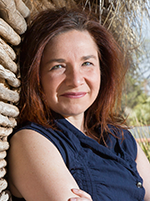 Katharine Hayhoe, associate professor in the Department of Political Science and Director
of TTU's Climate Science Center was quoted Feb. 23 in News of Chicago/The Atlantic
in an article that asks, "Is it OK to Enjoy the Warm Winters of Climate Change?" Given
the unusually pleasant weather this February—typically winter's harshest month across
the United States—those concerned about climate change may find themselves asking
ethical or existential concern as well as scientific ones. Hayhoe was quoted as saying
that people shouldn't hesitate to enjoy unseasonably warm days, whether or not they
are caused by climate change. "It's a good example of how all of the symptoms of a
changing climate are not negative. And if there is something good, then enjoying it
doesn't make [climate change] any better or worse than it would be otherwise," she
told the publication. "As it gets warmer, the negative impacts outweigh the positive
impacts," she said. "This will first look like hotter summers, pests moving northward,
and our air-conditioning and water bill going up. Having these unusual days that we
really notice, it makes us more aware of how other things are changing, too."
Katharine Hayhoe, associate professor in the Department of Political Science and Director
of TTU's Climate Science Center was quoted Feb. 23 in News of Chicago/The Atlantic
in an article that asks, "Is it OK to Enjoy the Warm Winters of Climate Change?" Given
the unusually pleasant weather this February—typically winter's harshest month across
the United States—those concerned about climate change may find themselves asking
ethical or existential concern as well as scientific ones. Hayhoe was quoted as saying
that people shouldn't hesitate to enjoy unseasonably warm days, whether or not they
are caused by climate change. "It's a good example of how all of the symptoms of a
changing climate are not negative. And if there is something good, then enjoying it
doesn't make [climate change] any better or worse than it would be otherwise," she
told the publication. "As it gets warmer, the negative impacts outweigh the positive
impacts," she said. "This will first look like hotter summers, pests moving northward,
and our air-conditioning and water bill going up. Having these unusual days that we
really notice, it makes us more aware of how other things are changing, too."
College of Arts & Sciences
-
Address
Texas Tech University, Box 41034, Lubbock, TX 79409-1034 -
Phone
806.742.3831 -
Email
arts-and-sciences@ttu.edu
